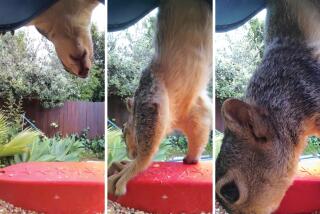Tape Keeps Birds From Plundering Fruit Trees
- Share via
Most of us probably don’t mind sharing some of the fruit from our home orchards with our resident bird friends. But it becomes enraging when a flock of greedy, feathered gourmets clean our trees completely of the fresh fruit that we’ve been eagerly anticipating.
If you have a bird problem in your home fruit orchard or vegetable garden, there’s a new product that can help you humanely and inexpensively control the problem.
The product is “bird scare flash tape” and it comes from Japan, where it has been used with great success in protecting fruit and rice crops.
The scare tape consists of Mylar-coated plastic tape that is 7/16th inch wide. It is brilliant, shiny red on one side and silver on the other. Sunlight is reflected off the tape and seems to signal danger to birds. Most experts believe that the birds associate the flashing tape with fire.
According to John Kaye, a Washington apple grower who imports the tape to this country, the scare tape results in a 75% to 90% reduction in bird damage to fruit or vegetable crops.
In years past, Kaye’s early apple crop was decimated by flocks of crows. Kaye attended a bird control seminar at Washington State University where he learned that the Japanese had a tape product that provided outstanding bird control. Kaye’s son was in Japan and got him some of the tape.
The tape performed marvelously and Kaye won the battle of the birds. He was so impressed with the tape that he began importing it and selling it to local farmers. Word spread. The tape was written up in a nationally syndicated gardening column and Kaye received a flood of orders for the tape from home gardeners.
Kaye now sells to both commercial growers and home orchardists. The high percentage of repeat orders he gets reinforces his faith in the tape.
Commercial growers usually apply the tape along a row of fruit trees on both sides of the row. The tape is strung up high, so the birds can see it. The tape needs to be strung loosely so breezes will move it and maximize the flashing effect.
For home gardeners who have only a few fruit trees scattered throughout the yard, the tape can be spiraled around the tree from top to bottom like decorating a Christmas tree. Or the tape may be cut in four-foot strips and flocked on individual tree branches.
In the vegetable garden, Kaye recommends installing the tape strung on 10-foot poles over the garden.
The bird tapes have a legion of admirers. Andy Mariani of Mariani Orchards in Morgan Hill, Calif., had a huge problem with starlings and linnets consuming his early cherry crop until he discovered the tape. Roger Boxx, a blueberry grower in Ferndale, Wash., describes the tapes as a very effective and inexpensive way to control birds. In addition, many grape growers report that the tape is highly effective in protecting their vineyards.
Kaye gives this advice about applying the tape: The tape should be applied to the trees just before the fruit ripens. If you apply it too early in the season, the birds will become used to it and it won’t be as effective.
Once the harvest is over, Kaye says the tape should be removed. It can be rewound and used on later-maturing crops. However, because the color fades when exposed to sunlight, the tape is only good for one season.
Other uses for the tape include predatory bird control at fish hatcheries and fish ponds and for protection of newly planted lawns and golf courses.
Kaye says the tape is more effective on flocking birds that fly overhead such as crows or starlings, than it is on birds like robins that stay close to the ground.
If you would like to sample the bird scare tape in your home orchard, the minimum order is five rolls for $12 (price includes shipping). Kaye says one roll will do two trees if they are wrapped individually; if using the tape to protect rows of trees, bear in mind that each roll contains about 290 feet of tape.
Tape may be ordered from Modern Agri-Products, 3770 Aldergrove Road., Ferndale, Wash. 98248; phone (206) 366-4343.






